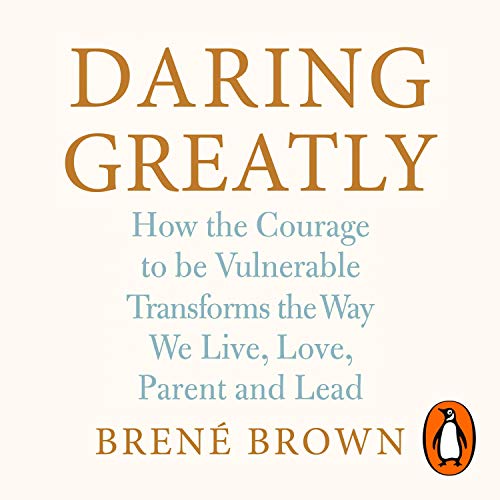“Owning our story and loving ourselves through that process is the bravest thing we’ll ever do.” (Brené Brown- Manifesto for the Brave and Brokenhearted)
The American researcher and internet phenomenon Brené Brown’s popular book, Daring Greatly, explores the importance of not giving up. Her ideas are inspired by a speech by Teddy Roosevelt, Citizenship in a Republic, delivered at the Sorbonne in Paris way back in 1910. You can read it at the end of this post.
Brené Brown’s unique take on courage is liberating. Read on to discover how her ideas will transform the way you feel about failure – and change the way you handle it.
The 3 core phases of the Rising Strong process
Failing in a work context can be so painful and hard to handle. It happens to all of us though at some point in our career. Perhaps more often than we might like to admit.
The goal of the Rising Strong process is about overcoming mistakes, facing the hurt, and rising from the falls. It is not about playing so safe, being so risk adverse that failure does not happen. It starts with awareness. Knowing when you’re in an emotional soup and your reactions are out of proportion. Rising Strong gives you a practical method to help you get back up when you fall, and it’s a process with three main phases:
- The Reckoning: walking into your story
- The Rumble: owning your story
- The Revolution: writing a new ending to change the way you engage with the world
It’s inspiring to know that, instead of worrying and fretting about failing, you can stand tall, own it, find a way to brush yourself off, learn from it, and carry on stronger than ever.
In Brené’s world, as a leader she suggests that the business landscape is an arena. As she eloquently puts it: “I want to live my life in the arena. You go in the arena, you get your ass kicked, period. You sign up to live a brave life, you’re going down. No-one ever lives in there and doesn’t fall.”
The reckoning – Walking into your story

The first phase is the foundation for real change and it’s a worthy challenge, something Brené calls The Reckoning: Walking into your Story. This is when you become curious about your feelings and begin to recognise how your emotions connect with the way you think and behave. In this open, exploring state, you often find you’ve constructed a story to justify what has happened, a tale that confirms your habitual world view. Brené calls this a Shitty First Draft, our SFD.
This idea is powerful stuff, hitting the core of us, the tender part we prefer to protect and deny at work. And Brené’s passion shines through when she says, “Every single one of us has stories that we have orphaned from our lives because we don’t think they fit with who we’re supposed to be. When you orphan those stories you’re not a whole person any more, you’re a part of who you are, and no great leader ever comes to the table in parts. When we deny our story, when we don’t talk about our failures we’re not whole. And, worse than that, you can never mentor anyone if you don’t tell them how to get back up, if you don’t openly discuss your falls, if you don’t tell them about the hard times, if you don’t tell them about the stuff that no one talks about.”
The rumbling – owning your story

Stopping, being curious, and observing yourself moves you into the second phase of the process, The Rumbling: Owning your Story. Here you grapple with your SFD, get real about it, confess the tall tales you’ve been making up about your struggles… and start to challenge them for what they are: confabulations you’ve unconsciously created to keep you safe. Even if your stories aren’t 100% fiction they’ll be emotionally charged and out of balance, therefore fascinating ground for self-discovery.
Once you know you’ve been making assumptions to self-protect, you’ve rumbled yourself. It’s difficult to give up long-held, cherished beliefs about how the world should be and the way you fit into it. But this new level of awareness has potency, giving you the chance to find new narratives pointing you towards positive change, helping you throw off the shackles to embrace a more wholehearted life.
As it turns out, being brave and resilient can be motivating even when it’s daunting. Brené believes in feeling the fear, doing it anyway, even embracing it.
“As leaders there’s a very simple thing, a choice we make every day. We choose courage or we choose comfort, but you cannot have both. There is nothing comfortable about being brave, nothing, and if you think you’re being brave and you’re really comfortable, you’re probably not being that brave.”
The revolution – Writing a new ending to your story

The third phase is The Revolution. Writing a new ending to your story. Here you discover how the old, habitual stories, those you tell yourself over and over again, are also up for grabs. You’re inspired by the ideas that junking some or all of them might give you fresh possibilities, different perspectives, essential learnings and lasting insights.
The new stories you create will overcome that unhelpful victim status to give you more agency, more confidence, and more resilience around failure. You may even go on to apply it to other areas of your life. Your stories are braver, more true, and more appropriate to the person you are. That’s how you shift the way you experience the world. And all this ultimately transforms the way you live, work, love, parent, and lead.
As Brené says: “Our job is not to deny the story, but to defy the ending—to rise strong, recognize our story, and rumble with the truth until we get to a place where we think, Yes. This is what happened. This is my truth. And I will choose how the story ends.”
Rolling Brené Brown’s ideas into our coaching
For Brené leadership success is about being human, being real, being honest with yourself and others, and by doing all that, being an inspiring, leader. It is not about never failing but having the courage to admit your mistakes and vulnerabilities, to fall and get up again bravely.
Because we understand the power of having robust conversations about difficult failures and work through tricky stories together, Brene’s work resonates strongly with the way we coach our clients. There is always potential to create a new narrative or shape a different ending.
As she so aptly says “We are the authors of our lives. We write our own daring endings.”
Learn more about Brené Brown’s ideas
Brené has openly raised these themes, so others find it easier to express what they’re feeling, and share experiences honestly and courageously. Over and over, Brené normalises the things we all experience, revealing a truth in the title of her first book: I Thought It Was Just Me. She reassures us that we all dwell on common ground, and we’re all human, even at work. By doing so she has given many people the tools they need to find the grit in themselves, tackle the challenges life throws up, and to live more wholeheartedly.
Below is the quote that Brené that influenced her strongly and she speaks about often.
Teddy Roosevelt, Citizenship in a Republic, The Sorbonne, Paris, 1910
“It is not the critic who counts;
not the man who points out how the strong man stumbles,
or where the doer of deeds could have done them better.
The credit belongs to the man who is actually in the arena,
whose face is marred by dust and sweat and blood;
who strives valiantly;
who errs, who comes short again and again,
because there is no effort without error and shortcoming;
but who does actually strive to do the deeds;
who knows great enthusiasms, the great devotions;
who spends himself in a worthy cause;
who at the best knows in the end the triumph of high achievement,
and who at the worst, if he fails,
at least fails while
daring greatly…”
About us:
We create the space for leaders to step back, think clearly, and navigate complexity with confidence. By sharpening the narrative that drives decisions, teams, and performance, we help leaders move forward with clarity and impact. Our approach blends deep listening, incisive challenge, and commercial focus—strengthening leadership at every level, from business transformation to boardroom decisions.
“We share resources that help coaches deepen their practice and expand their impact. The articles on this site are designed to spark fresh thinking, offer practical tools, and support the continuous growth of coaches at every stage. “
Jude Elliman
Founder
Our Core Approach:
We work with leaders to sharpen their thinking, strengthen their leadership, and navigate complexity with confidence. Our approach is built around three core areas:
Narrative Coaching – Working with the stories that shape leadership, teams, and organisations.
Commercial Focus – Cutting through complexity to drive clear, strategic decisions.
Challenge & Space – Asking the right questions while creating the space to reflect and grow.
Through this, we help leaders drive transformation, align teams, and make high-stakes decisions with clarity and impact.

